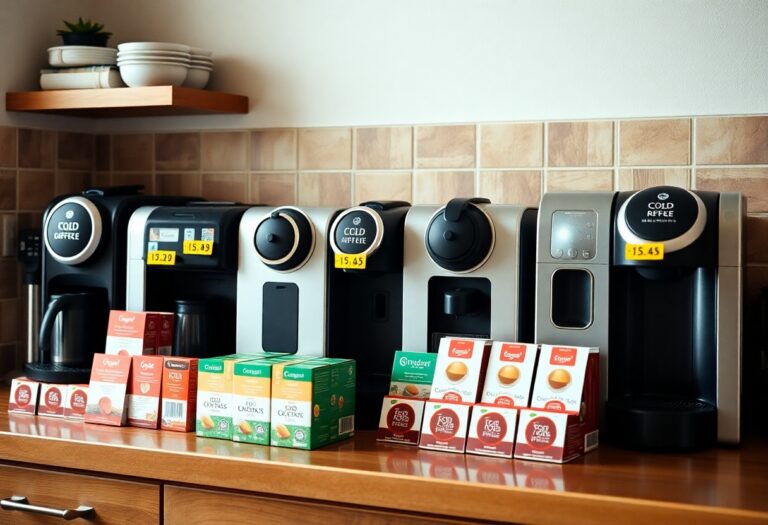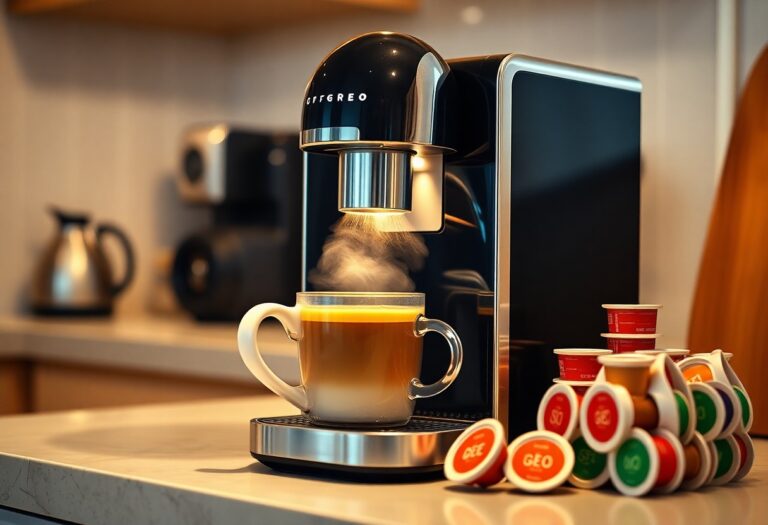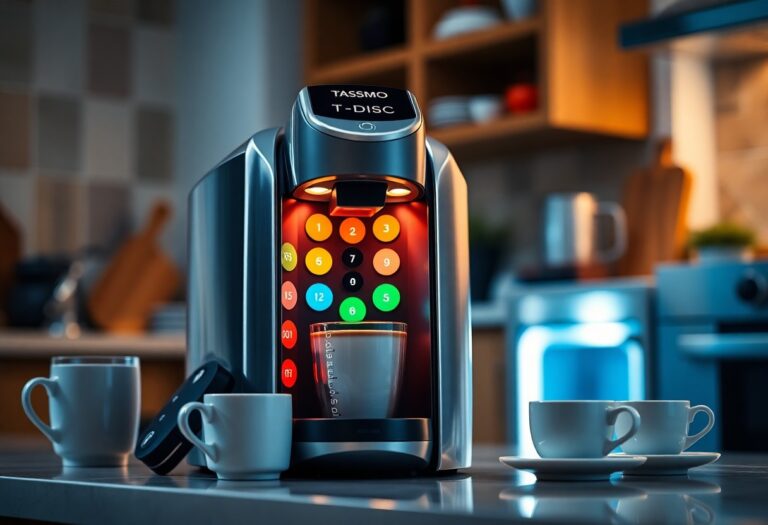What Happens if You Drink Coffee Machine Cleaner – Safety Warning
You may not realize that drinking coffee machine cleaner can lead to serious health risks. These cleaners often contain harsh chemicals like sodium hydroxide and phosphoric acid, which can cause severe burns, vomiting, and respiratory issues. If you or someone you know accidentally ingests this type of cleaner, it is vital to seek immediate medical attention. For guidance on what steps to take, visit What should I do if I accidentally drank cleaning fluid? Is … to learn more.
Key Takeaways:
- Drinking coffee machine cleaner can cause severe health issues, including nausea, vomiting, and chemical burns.
- These cleaners often contain hazardous chemicals like phosphoric acid and sodium hydroxide, which are toxic when ingested.
- If accidental ingestion occurs, it is necessary to seek immediate medical attention or contact poison control.
- Always store coffee machine cleaners out of reach of children and clearly label containers to prevent accidental consumption.
- Follow safety instructions on the product label carefully to avoid exposure and ensure proper use of cleaning products.
The Dangers Lurking in Coffee Machine Cleaners
Coffee machine cleaners often contain a blend of corrosive chemicals designed to break down mineral buildup and residue. These substances, though effective for cleaning, pose serious health threats if ingested. Common ingredients include phosphoric acid, sodium hydroxide, and other hazardous compounds. If you’re curious about specific products, you can find details about Cafiza Espresso Machine Cleaning Tablets and their ingredients. These cleaners are meant for equipment, not for consumption, and understanding their potential risks is vital.
Common Ingredients and Their Toxicity
Many coffee machine cleaners use ingredients like citric acid and sodium carbonate, which can cause harmful effects on your body if consumed. Other components, like surfactants, while useful for cleaning, can irritate the digestive system and skin upon contact. The toxicity levels of these ingredients vary, but they collectively create a dangerous cocktail that can lead to serious health issues.
Immediate Health Risks After Ingestion
If you ingest coffee machine cleaner, you might experience immediate health risks such as nausea, vomiting, abdominal pain, and diarrhea. In more severe cases, chemical burns to the mouth and throat can occur, along with difficulty swallowing or breathing. Prompt medical attention is necessary, as the effects can escalate quickly, depending on the amount consumed.
The risks associated with drinking coffee machine cleaner are alarming. Symptoms such as severe vomiting or abdominal pain can manifest within minutes or hours. If not treated promptly, serious health complications can arise, including damage to your mouth, throat, and gastrointestinal tract due to the corrosive nature of these cleaners. Always seek help from a medical professional if you suspect ingestion, as timely treatment can mitigate the dangers significantly.
What to Expect After Accidental Ingestion
Accidentally ingesting coffee machine cleaner can lead to immediate distress and a range of troubling symptoms. You may experience intense nausea, vomiting, and abdominal pain within minutes. The corrosive nature of these cleaners can also result in throat irritation or burns, making it difficult to swallow or breathe properly. Prompt medical attention is necessary to address any damage and alleviate symptoms effectively.
Symptoms of Poisoning
Symptoms associated with coffee machine cleaner poisoning include nausea, vomiting, abdominal pain, diarrhea, and throat burns. Depending on the severity of the ingestion, headaches or even confusion may occur. Immediate medical intervention is necessary to mitigate these effects and provide appropriate treatment.
Potential Long-term Health Consequences
If the ingestion of coffee machine cleaner is severe, long-term health consequences can manifest. Tissue damage from caustic chemicals may lead to chronic issues such as esophageal strictures or gastrointestinal complications. In some cases, respiratory problems can develop if fumes are inhaled during an accident. Routine follow-ups and monitoring by healthcare professionals may be necessary to manage ongoing complications.
Long-term health consequences can be serious and vary based on the amount ingested and the specific chemicals involved. For example, exposure to certain caustic agents may lead to permanent damage in the digestive tract or respiratory system. It is not uncommon for individuals to face challenges like recurring difficulty swallowing or chronic pain. Such health complications can significantly impact your quality of life, making it imperative to seek immediate assistance if ingestion occurs.

Immediate Actions to Take if Coffee Cleaner is Swallowed
If you or someone else has swallowed coffee machine cleaner, act swiftly to minimize potential harm. Rinse the mouth thoroughly with water to remove any remaining residue. Avoid inducing vomiting unless directed by a healthcare professional, as this could cause further damage to the esophagus or throat. Drinking a small amount of water or milk may help dilute the chemicals, but only do so if there are no symptoms of choking. Keep the container or label of the cleaner handy, as this will assist medical professionals in determining the appropriate treatment.
First Aid Measures at Home
At home, start by ensuring the affected person remains calm and seated. Administer water or milk if they are conscious and able to swallow without difficulty. Monitor for symptoms such as severe abdominal pain, difficulty breathing, or any unusual behavior, which may indicate a severe reaction. If any symptoms arise, be prepared to provide detailed information to emergency services.
When to Seek Professional Medical Help
Consult a medical professional immediately if any signs of distress develop after swallowing coffee machine cleaner. Symptoms like persistent vomiting, abdominal pain, or difficulty swallowing warrant urgent attention. Additionally, even if the individual appears fine initially, the corrosive nature of these chemicals can lead to delayed reactions and complications.
Seeking professional medical help is imperative because coffee machine cleaners often contain strong acids or bases, which can cause serious damage over time. If you observe any alarming symptoms, such as severe pain or signs of chemical burns in the mouth or throat, don’t hesitate to call emergency services. It’s better to err on the side of caution, as timely medical intervention can be lifesaving and can mitigate long-term damage. Make sure to provide as much information as possible about the cleaner consumed, including ingredients if available.

Prevention: Safeguarding Against Household Accidents
Proactively preventing accidents related to cleaning supplies can protect you and your family from harmful exposures. By implementing strategic storage solutions and clear communication, you can create a safer environment in your home. Establishing these practices significantly reduces the risks of accidental ingestion or misuse of hazardous products, especially those containing toxic chemicals.
Safe Storage Practices for Cleaning Supplies
Store cleaning supplies in a secure location, preferably in a locked cabinet, out of reach of children and pets. Always keep products in their original containers with clear labels, avoiding the temptation to repurpose food containers. Adding childproof locks and using high shelves where necessary can further enhance safety measures and prevent unintended access.
Educating Household Members on Risks
Involving everyone in your home in safety discussions fosters a culture of awareness regarding the dangers of cleaning products. Clearly explain the risks associated with ingesting substances like coffee machine cleaners, as well as proper cleaning techniques to avoid contamination. Regular reminders about these hazards ensure that family members stay vigilant and responsible.
Discussing risks should be tailored to the comprehension levels of all household members. For children, using simple language and relatable scenarios can help them grasp the potential dangers. Adults can benefit from more detailed insights into the chemicals present in cleaning supplies. Regular safety meetings can reinforce these points, making everyone aware of the proper handling and storage necessary to avoid accidents, ultimately cultivating a household environment that prioritizes safety and responsibility.
Legal and Compliance Considerations
Legislation and compliance standards play a significant role in the safety of household cleaning products, including coffee machine cleaners. Manufacturers are required to adhere to guidelines set forth by organizations like the Environmental Protection Agency (EPA) and the Consumer Product Safety Commission (CPSC). These regulations demand clear labeling, proper hazard warnings, and adherence to safety protocols to safeguard consumers from potential risks associated with improper use or accidental ingestion of their products.
Regulations Surrounding Household Cleaning Products
Household cleaning products are classified under the Federal Insecticide, Fungicide, and Rodenticide Act (FIFRA), requiring that all chemical products used in consumer settings undergo rigorous safety evaluations. Proper labeling not only informs you of the product’s intended use but also outlines necessary precautions, potential risks, and first aid measures should ingestion occur. The guidelines ensure that products are marketed safely without misleading claims about their toxicity or usage.
Implications for Manufacturers and Consumers
For manufacturers, non-compliance with safety regulations can lead to hefty fines, legal action, and damage to brand reputation. For consumers, purchasing non-compliant products increases the likelihood of accidents and health risks associated with improper usage. Furthermore, the importance of understanding product labels cannot be overstated; being aware of ingredients and potential hazards allows you to make informed choices, thereby shielding yourself and your family from harmful exposure.
Manufacturers face constant pressure to balance efficacy and safety, often investing substantial resources to ensure compliance with legal standards. For you as a consumer, staying informed about the products you use can help you avoid dangerous situations. By scrutinizing labels for clear hazard warnings and adhering to the manufacturer’s guidelines, you not only protect yourself but also influence manufacturers to maintain higher safety standards in their formulations. An educated consumer base prompts companies to prioritize safety in product design and labeling, creating a more trustworthy market overall.
Final Words
Summing up, if you accidentally drink coffee machine cleaner, it’s vital to seek medical attention immediately. These products contain harsh chemicals that can cause serious harm to your health. Always store such cleaners out of reach and be cautious during their use. Understanding the risks associated with these substances can help you maintain a safe environment in your kitchen. Prioritize your safety by reading labels carefully and following all usage instructions to prevent any harmful incidents.
FAQ
Q: What are the primary ingredients in coffee machine cleaners that make them dangerous if ingested?
A: Coffee machine cleaners typically contain strong acids or detergents, such as citric acid, phosphoric acid, or sodium hydroxide. These chemicals are designed to break down mineral buildup and coffee oils but are toxic to humans if ingested. Consuming these substances can lead to severe health issues, including gastrointestinal problems, chemical burns, or even poisoning.
Q: What immediate actions should I take if I accidentally consume coffee machine cleaner?
A: If you or someone else accidentally consumes coffee machine cleaner, it’s important to seek emergency medical attention immediately. Do not induce vomiting unless instructed by a healthcare professional. Rinse the mouth with water and ensure to provide any information about the specific product ingested, including its ingredients, to medical personnel for proper treatment.
Q: Are there any long-term health effects from drinking coffee machine cleaner?
A: Yes, depending on the extent of exposure and the amount ingested, there can be long-term health effects from drinking coffee machine cleaner. These may include chronic gastrointestinal issues, damage to the esophagus or stomach lining, and potential long-term organ damage. It is critical to undergo medical evaluation and treatment to minimize any lasting effects.
Q: How can I safely use coffee machine cleaner to avoid accidental ingestion?
A: To use coffee machine cleaner safely, always follow the manufacturer’s instructions on the product label. Keep the cleaner and any coffee-making supplies out of reach of children and pets. Ensure proper ventilation while using the cleaner and never mix it with other household cleaners. Cleaning your coffee machine should be done when you are alert and focused to avoid accidental misuse.
Q: What symptoms should I watch for after accidental ingestion of coffee machine cleaner?
A: Symptoms to watch for after ingesting coffee machine cleaner can include nausea, vomiting, abdominal pain, difficulty swallowing, burns in the mouth or throat, and difficulty breathing. Depending on the severity of exposure and the specific chemicals involved, symptoms can vary. Seek medical attention if any of these symptoms occur, even if they seem mild, as they could progress quickly.







